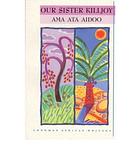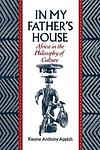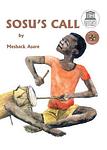The Greatest Ghanaian Books of All Time
Click to learn how this list is calculated.
This list represents a comprehensive and trusted collection of the greatest books. Developed through a specialized algorithm, it brings together 284 'best of' book lists to form a definitive guide to the world's most acclaimed books. For those interested in how these books are chosen, additional details can be found on the rankings page.
Genres
Countries
Date Range
Reading Statistics
Click the button below to see how many of these books you've read!
Download
If you're interested in downloading this list as a CSV file for use in a spreadsheet application, you can easily do so by clicking the button below. Please note that to ensure a manageable file size and faster download, the CSV will include details for only the first 500 books.
Download-
1. The Beautyful Ones are Not Yet Born by Ayi K. Armah
The novel explores the life of a railway clerk in Ghana who refuses to accept the corruption that is rife in his society. Despite his family's struggles with poverty, he remains steadfast in his moral convictions, rejecting the easy path of bribery and deception. The protagonist's integrity contrasts sharply with the greed and materialism of his peers, providing a stark commentary on post-colonial African society. The book is a powerful critique of corruption and a testament to the strength of individual integrity.
-
2. Homegoing by Yaa Gyasi
This epic novel traces the lineage of two half-sisters from 18th century Ghana to present day America. One sister is sold into slavery and shipped to America, while the other is married off to a British slaver and remains in Africa. The book follows their descendants through the generations, exploring the lasting impact of slavery and colonialism on Black lives. The narrative showcases the struggles, resilience, and triumphs of each generation, providing a deep and personal view into the historical events and societal changes that shaped their lives.
-
3. Our Sister Killjoy by Ama Ata Aidoo
This novel explores the journey of a young African woman who travels to Europe on a scholarship, only to confront the stark realities of neocolonialism and the African diaspora's experiences in the West. Through her eyes, readers are exposed to themes of identity, alienation, and the complexities of cultural assimilation. The protagonist's observations and interactions challenge the romanticized views of Europe, offering a critical examination of the impacts of colonialism and the ongoing struggle for self-definition and autonomy among Africans both at home and abroad. The narrative is a poignant critique of postcolonial society, delivered through a blend of prose and poetry that captures the protagonist's internal and external conflicts.
-
4. Anowa by Ama Ata Aidoo
"Anowa" is a thought-provoking play that delves into the complexities of love, tradition, and the clash between individual desires and societal expectations. Set in an African village, the story follows Anowa, a strong-willed and independent young woman, as she defies societal norms by rejecting potential suitors and choosing her own path. However, her unconventional choices lead to tragic consequences, highlighting the consequences of challenging traditional values and the limitations placed on women in a patriarchal society.
-
5. Ethiopia Unbound by J.E. Casely Hayford
"Ethiopia Unbound" is a thought-provoking and insightful exploration of Ethiopia's rich history, culture, and potential for progress. Written by J.E. Casely Hayford, this book delves into the country's ancient civilization, its struggles against colonization, and its quest for independence. With a focus on Ethiopia's unique identity and the importance of embracing its cultural heritage, Hayford presents a compelling argument for Ethiopia's future as a prosperous and united nation.
-
6. Ghana: The Autobiography Of Kwame Nkrumah by Kwame Nkrumah
This autobiography tells the story of Kwame Nkrumah, the first President of Ghana and a key figure in the country's struggle for independence from British colonial rule. Nkrumah recounts his early life, his education abroad, and his political journey, providing insights into his vision for a united and prosperous Africa. He reflects on the challenges faced during his presidency, including the economic and political obstacles that hindered Ghana's progress. Overall, this book offers a personal account of Nkrumah's life and the pivotal role he played in shaping Ghana's history.
-
7. Changes by Ama Ata Aidoo
"Changes" is a novel that explores the complexities of modern African life, particularly for women, through the story of its protagonist, a young woman named Esi. After enduring an unhappy marriage, Esi decides to divorce her husband in pursuit of independence and personal fulfillment. She then enters into a polygamous marriage with a man named Ali, believing it will allow her more freedom and respect. However, as the narrative unfolds, Esi confronts the realities and challenges of her choices, including societal expectations, the intricacies of love, and the struggle for a sense of identity amidst the changing cultural landscape of contemporary Ghana. The novel delves into themes of feminism, tradition, and the evolving roles of women in society.
-
8. In My Father's House by Anthony Appiah
"In My Father's House" by Anthony Appiah is a thought-provoking exploration of the complexities of African identity and the concept of cultural authenticity in a globalized world. Through personal anecdotes, historical analysis, and philosophical reflections, the author challenges essentialist notions of African culture, arguing for a more fluid understanding that embraces the diverse influences and hybridity of modern African societies. Appiah's nuanced perspective sheds light on the intricate interplay between tradition and modernity, and invites readers to question and redefine their own cultural identities.
-
9. Cutting The Rose by Efua Doorkenoo
"Cutting The Rose" is a gripping and thought-provoking novel that delves into the complexities of identity, culture, and the power dynamics within a Ghanaian community. Set in the 1960s, the story follows the life of a young woman named Akosua, who must navigate the expectations placed upon her as a woman in a patriarchal society while also grappling with her own desires and ambitions. Through vivid storytelling and rich character development, the author explores themes of tradition, love, and the pursuit of self-discovery in a changing world.
-
10. Sosu's Call by Meshack Asare
"Sosu's Call" tells the story of a young boy named Sosu, who is born without the ability to walk. Despite this physical limitation, Sosu possesses a remarkable talent for carving beautiful objects out of wood. When his village is hit by a devastating storm, Sosu's bravery and resourcefulness are put to the test as he must find a way to save his community from the aftermath of the disaster. Through determination and the power of his artistic gift, Sosu becomes a symbol of hope and inspiration for his village.
-
11. Wife Of The Gods by Kwei Quartey
In a small village in Ghana, a young woman's body is found in a sacred forest, sparking an investigation led by Detective Inspector Darko Dawson. As he delves into the case, Darko uncovers a web of secrets and corruption that reaches high into the country's political elite. Along the way, he must confront his own personal demons and navigate the complexities of his culture and beliefs. With vivid descriptions of Ghanaian life and a gripping plot, "Wife Of The Gods" is a compelling crime novel that explores themes of tradition, power, and the clash between modernity and ancient customs.
-
12. Interventions by Kofi Annan
This book is a compelling memoir and a detailed account of the diplomatic life of one of the world's most esteemed peacemakers. Through a series of engaging narratives, the author shares his experiences and the lessons learned during his tenure as the Secretary-General of the United Nations. He delves into the complexities of negotiating peace, fostering development, and promoting democracy across the globe, while also addressing the myriad challenges he faced, from conflicts and wars to global health crises and the fight against poverty. The author's insights into the intricacies of international diplomacy and his unwavering commitment to peace and justice make this work an invaluable resource for understanding the efforts required to sustain global harmony and security.
Reading Statistics
Click the button below to see how many of these books you've read!
Download
If you're interested in downloading this list as a CSV file for use in a spreadsheet application, you can easily do so by clicking the button below. Please note that to ensure a manageable file size and faster download, the CSV will include details for only the first 500 books.
Download








